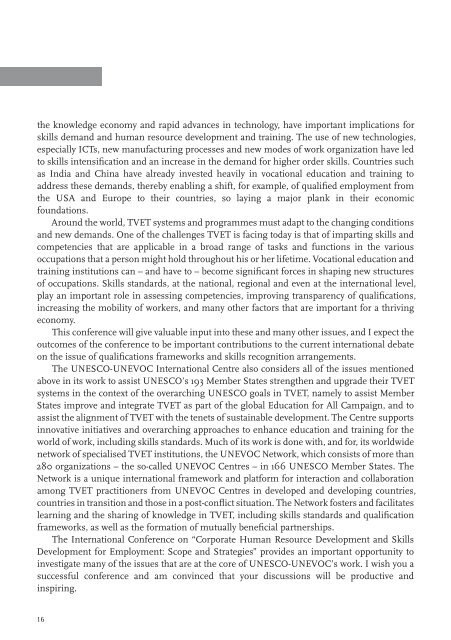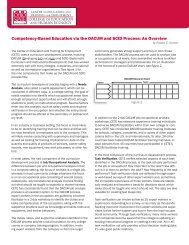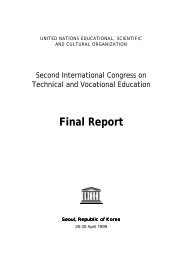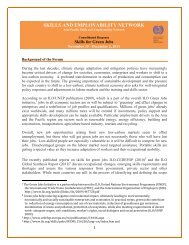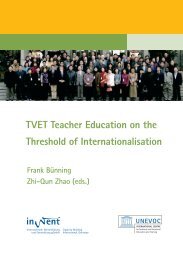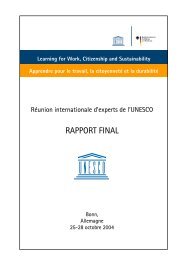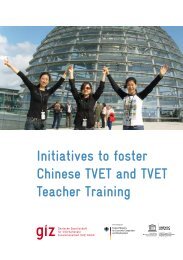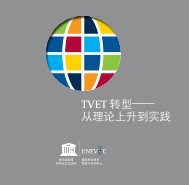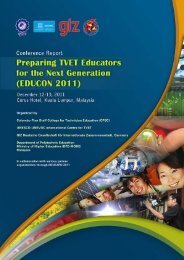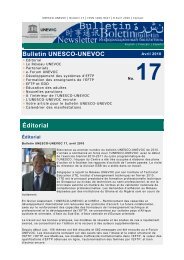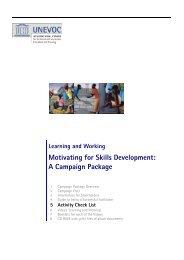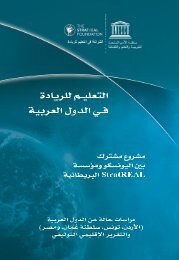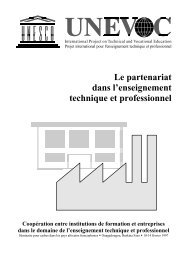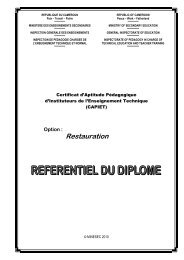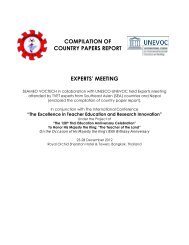Corporate HRD and Skills Development for ... - Unesco-Unevoc
Corporate HRD and Skills Development for ... - Unesco-Unevoc
Corporate HRD and Skills Development for ... - Unesco-Unevoc
You also want an ePaper? Increase the reach of your titles
YUMPU automatically turns print PDFs into web optimized ePapers that Google loves.
the knowledge economy <strong>and</strong> rapid advances in technology, have important implications <strong>for</strong><br />
skills dem<strong>and</strong> <strong>and</strong> human resource development <strong>and</strong> training. The use of new technologies,<br />
especially ICTs, new manufacturing processes <strong>and</strong> new modes of work organization have led<br />
to skills intensification <strong>and</strong> an increase in the dem<strong>and</strong> <strong>for</strong> higher order skills. Countries such<br />
as India <strong>and</strong> China have already invested heavily in vocational education <strong>and</strong> training to<br />
address these dem<strong>and</strong>s, thereby enabling a shift, <strong>for</strong> example, of qualified employment from<br />
the USA <strong>and</strong> Europe to their countries, so laying a major plank in their economic<br />
foundations.<br />
Around the world, TVET systems <strong>and</strong> programmes must adapt to the changing conditions<br />
<strong>and</strong> new dem<strong>and</strong>s. One of the challenges TVET is facing today is that of imparting skills <strong>and</strong><br />
competencies that are applicable in a broad range of tasks <strong>and</strong> functions in the various<br />
occupations that a person might hold throughout his or her lifetime. Vocational education <strong>and</strong><br />
training institutions can – <strong>and</strong> have to – become significant <strong>for</strong>ces in shaping new structures<br />
of occupations. <strong>Skills</strong> st<strong>and</strong>ards, at the national, regional <strong>and</strong> even at the international level,<br />
play an important role in assessing competencies, improving transparency of qualifications,<br />
increasing the mobility of workers, <strong>and</strong> many other factors that are important <strong>for</strong> a thriving<br />
economy.<br />
This conference will give valuable input into these <strong>and</strong> many other issues, <strong>and</strong> I expect the<br />
outcomes of the conference to be important contributions to the current international debate<br />
on the issue of qualifications frameworks <strong>and</strong> skills recognition arrangements.<br />
The UNESCO-UNEVOC International Centre also considers all of the issues mentioned<br />
above in its work to assist UNESCO’s 193 Member States strengthen <strong>and</strong> upgrade their TVET<br />
systems in the context of the overarching UNESCO goals in TVET, namely to assist Member<br />
States improve <strong>and</strong> integrate TVET as part of the global Education <strong>for</strong> All Campaign, <strong>and</strong> to<br />
assist the alignment of TVET with the tenets of sustainable development. The Centre supports<br />
innovative initiatives <strong>and</strong> overarching approaches to enhance education <strong>and</strong> training <strong>for</strong> the<br />
world of work, including skills st<strong>and</strong>ards. Much of its work is done with, <strong>and</strong> <strong>for</strong>, its worldwide<br />
network of specialised TVET institutions, the UNEVOC Network, which consists of more than<br />
280 organizations – the so-called UNEVOC Centres – in 166 UNESCO Member States. The<br />
Network is a unique international framework <strong>and</strong> plat<strong>for</strong>m <strong>for</strong> interaction <strong>and</strong> collaboration<br />
among TVET practitioners from UNEVOC Centres in developed <strong>and</strong> developing countries,<br />
countries in transition <strong>and</strong> those in a post-conflict situation. The Network fosters <strong>and</strong> facilitates<br />
learning <strong>and</strong> the sharing of knowledge in TVET, including skills st<strong>and</strong>ards <strong>and</strong> qualification<br />
frameworks, as well as the <strong>for</strong>mation of mutually beneficial partnerships.<br />
The International Conference on “<strong>Corporate</strong> Human Resource <strong>Development</strong> <strong>and</strong> <strong>Skills</strong><br />
<strong>Development</strong> <strong>for</strong> Employment: Scope <strong>and</strong> Strategies” provides an important opportunity to<br />
investigate many of the issues that are at the core of UNESCO-UNEVOC’s work. I wish you a<br />
successful conference <strong>and</strong> am convinced that your discussions will be productive <strong>and</strong><br />
inspiring.<br />
16


